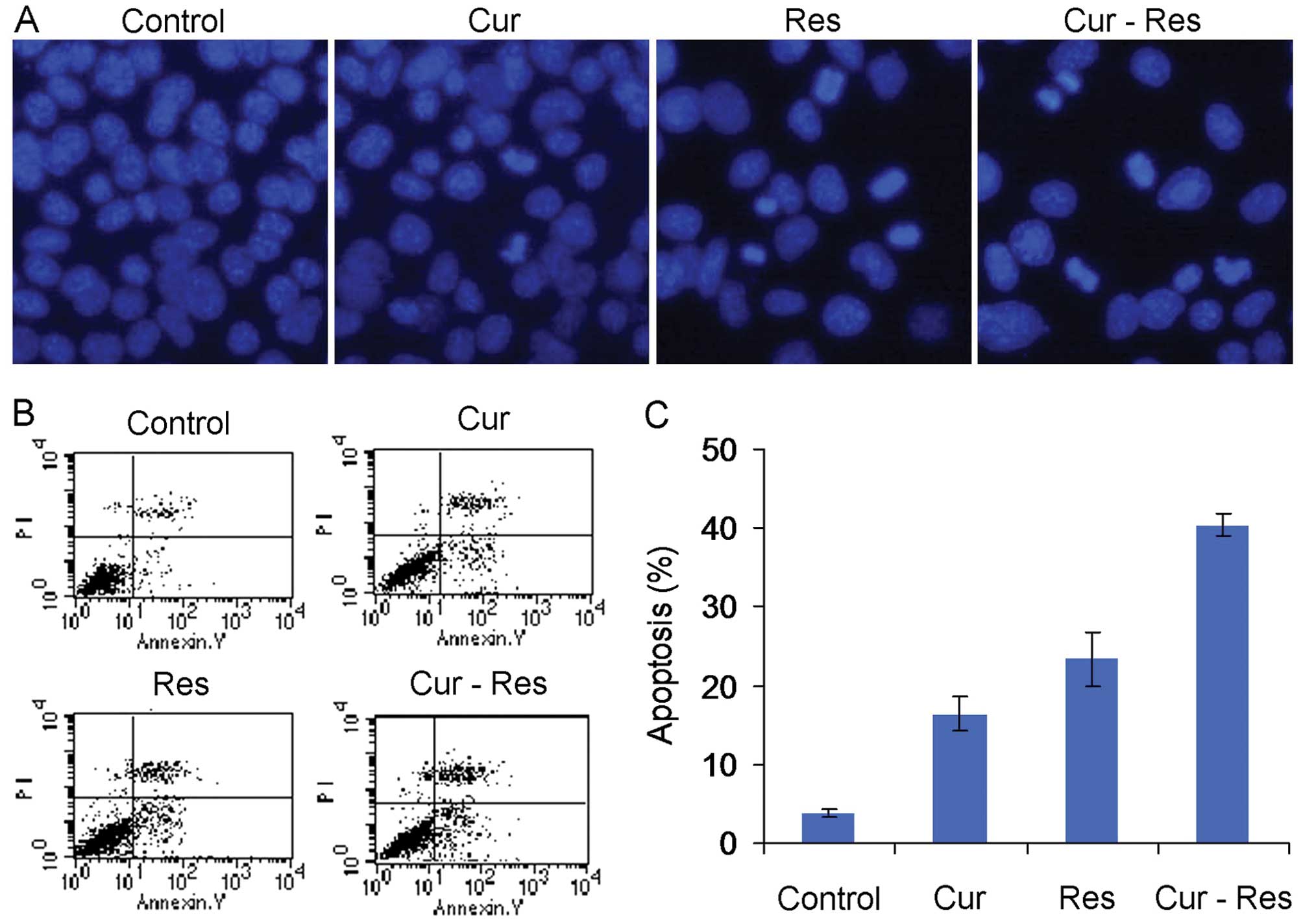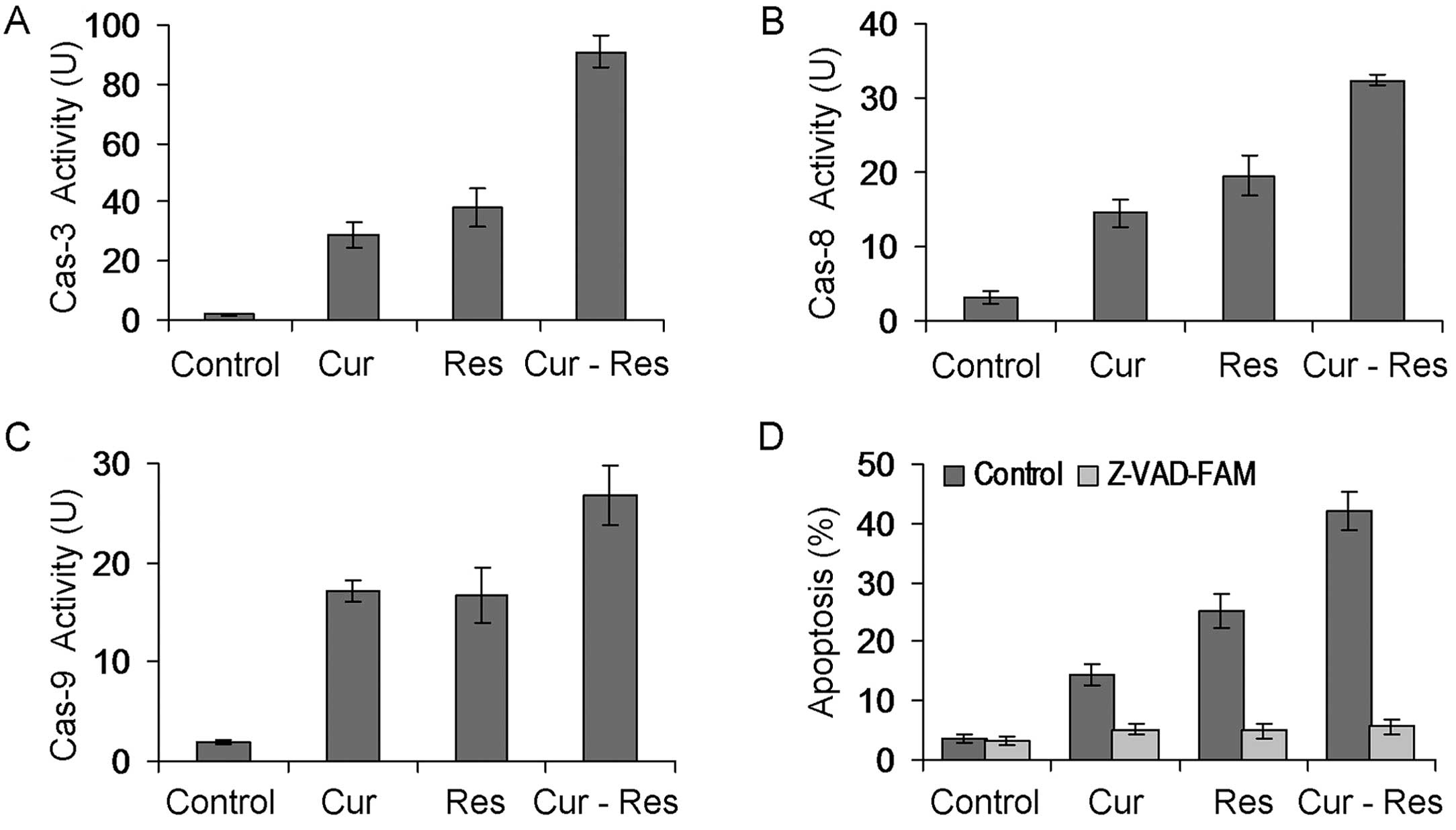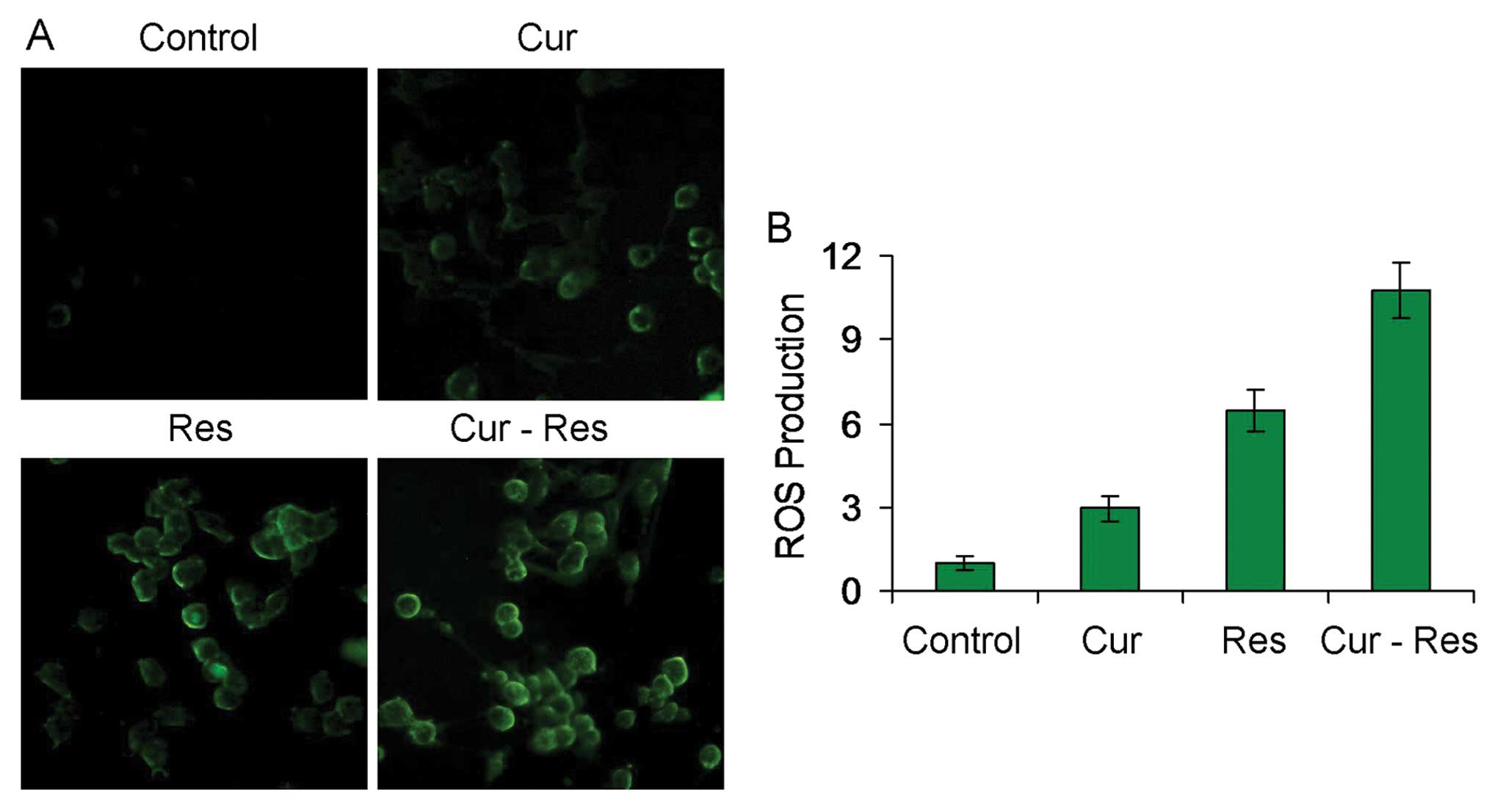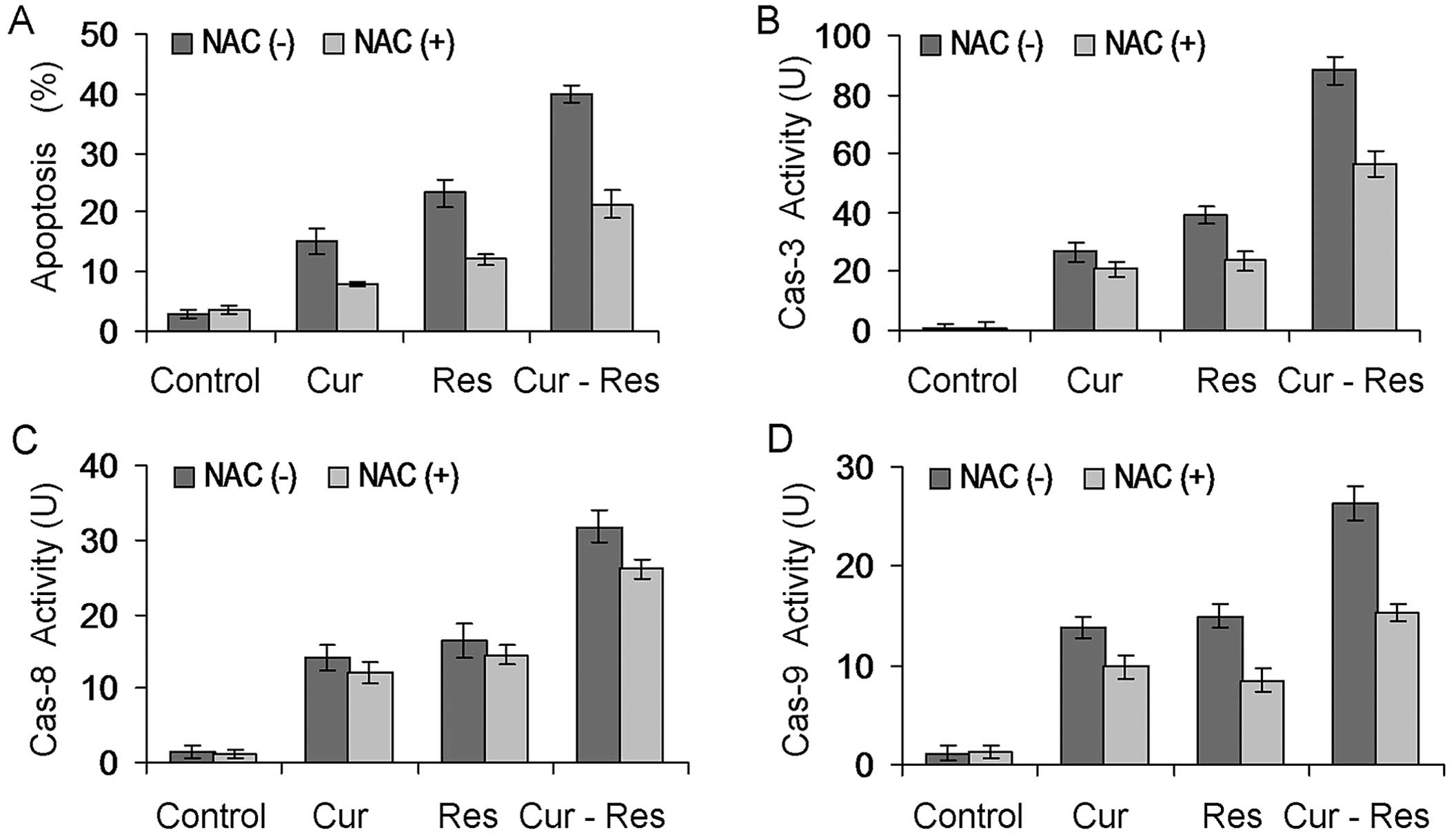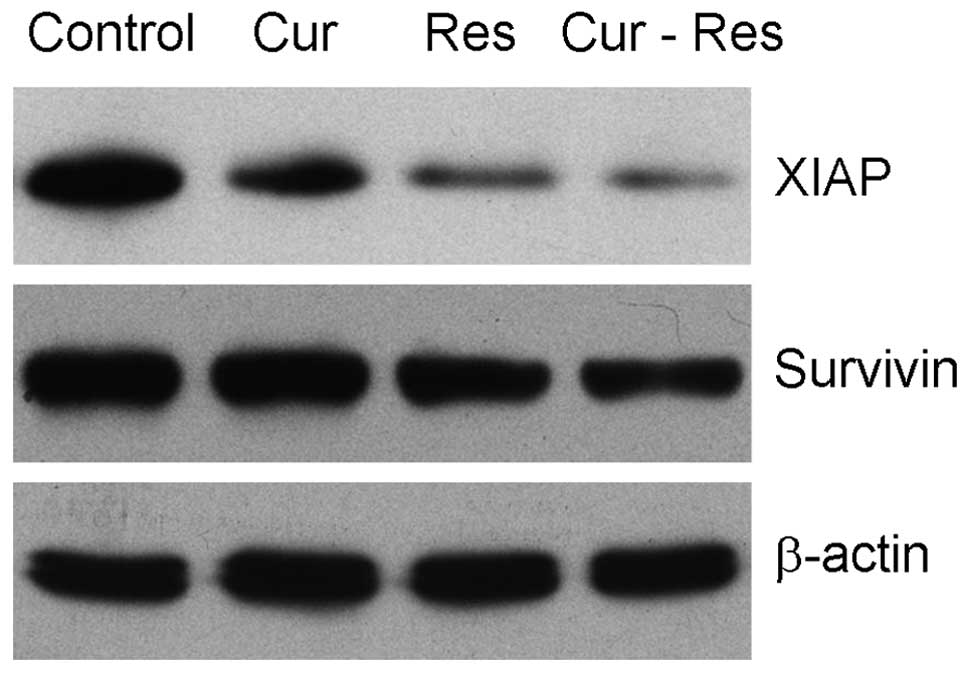|
1
|
Jemal A, Bray F, Center MM, Ferlay J, Ward
E and Forman D: Global cancer statistics. CA Cancer J Clin.
61:69–90. 2011. View Article : Google Scholar
|
|
2
|
Rampone B, Schiavone B and Confuorto G:
Current management of hepatocellular cancer. Curr Oncol Rep.
12:186–192. 2010. View Article : Google Scholar
|
|
3
|
El-Serag HB: Hepatocellular carcinoma. N
Engl J Med. 365:1118–1127. 2011. View Article : Google Scholar : PubMed/NCBI
|
|
4
|
Du Q, Hu B, Shen KP and An HM:
Pathogenesis and treatment law of Traditional Chinese Medicine in
hepatocarcinoma. World J Integr Tradit West Med. 5:814–817.
2010.(In Chinese).
|
|
5
|
Tang CC, Qin KL and Huang KX: The chemical
constituents of the stems and leaves of Curcuma aromaticaand
its anticancer activities. J Wenzhou Med Coll. 37:110–113. 2007.(In
Chinese).
|
|
6
|
Hu B, Shen KP, An HM, Wu Y and Du Q:
Aqueous extract of Curcuma aromatica induces apoptosis and
G2/M arrest in human colon carcinoma LS-174-T cells independent of
p53. Cancer Biother Radiopharm. 26:97–104. 2011.
|
|
7
|
Dai GH, Yang F and Tong YL: Study on
effect of Polygoniextract on human hepatocarcinoma cell line
HepG-2 in vitro. Chinese J Tradit Med Sci Technol. 16:376–377.
2009.(In Chinese).
|
|
8
|
Shin JA, Shim JH, Jeon JG, Jeon JG, Choi
KH, Choi ES, Cho NP and Cho SD: Apoptotic effect of Polygonum
cuspidatum in oral cancer cells through the regulation of
specificity protein 1. Oral Dis. 17:162–170. 2011.
|
|
9
|
Lin YW, Yang FJ, Chen CL, Lee WT and Chen
RS: Free radical scavenging activity and antiproliferative
potential of Polygonum cuspidatum root extracts. J Nat Med.
64:146–152. 2010. View Article : Google Scholar : PubMed/NCBI
|
|
10
|
Li M and Zhang N: To study the quality
control of Curcuma aromatica. J Chinese Med Mater.
31:540–543. 2008.(In Chinese).
|
|
11
|
Ravindran J, Prasad S and Aggarwal BB:
Curcumin and cancer cells: how many ways can curry kill tumor cells
selectively? AAPS J. 11:495–510. 2009. View Article : Google Scholar : PubMed/NCBI
|
|
12
|
Feng L, Zhang LF, Yan T, Jin J and Tao WY:
Studies on active substance of anticancer effect in Polygonum
cuspidatum. J Chinese Med Mater. 29:689–691. 2006.(In
Chinese).
|
|
13
|
Jang M, Cai L, Udeani GO, Slowing KV,
Thomas CF, Beecher CW, Fong HH, Farnsworth NR, Kinghorn AD, Mehta
RG, Moon RC and Pezzuto JM: Cancer chemopreventive activity of
resveratrol, a natural product derived from grapes. Science.
275:218–220. 1997. View Article : Google Scholar : PubMed/NCBI
|
|
14
|
Weng CJ, Yang YT, Ho CT and Yen GC:
Mechanisms of apoptotic effects induced by resveratrol,
dibenzoylmethane, and their analogues on human lung carcinoma
cells. J Agric Food Chem. 57:5235–5243. 2009. View Article : Google Scholar : PubMed/NCBI
|
|
15
|
Mo W, Xu X, Xu L, Wang F, Ke A, Wang X and
Guo X: Resveratrol inhibits proliferation and induces apoptosis
through the hedgehog signaling pathway in pancreatic cancer cells.
Pancreatology. 11:601–609. 2011. View Article : Google Scholar : PubMed/NCBI
|
|
16
|
Liao PC, Ng LT, Lin LT, Richardson CD,
Wang GH and Lin CC: Resveratrol arrests cell cycle and induces
apoptosis in human hepatocellular carcinoma Huh-7 cells. J Med
Food. 13:1415–1423. 2010. View Article : Google Scholar : PubMed/NCBI
|
|
17
|
Tang FY, Su YC, Chen NC, Hsieh HS and Chen
KS: Resveratrol inhibits migration and invasion of human
breast-cancer cells. Mol Nutr Food Res. 52:683–691. 2008.
View Article : Google Scholar : PubMed/NCBI
|
|
18
|
Weng YL, Liao HF, Li AF, Chang JC and
Chiou RY: Oral administration of resveratrol in suppression of
pulmonary metastasis of BALB/c mice challenged with CT26 colorectal
adenocarcinoma cells. Mol Nutr Food Res. 54:259–267. 2010.
View Article : Google Scholar : PubMed/NCBI
|
|
19
|
Patel BB and Majumdar AP: Synergistic role
of curcumin with current therapeutics in colorectal cancer:
minireview. Nutr Cancer. 61:842–846. 2009. View Article : Google Scholar : PubMed/NCBI
|
|
20
|
Rashid A, Liu C, Sanli T, Tsianli E, Singh
G, Bristow RG, Dayes I, Lukka H, Wright J and Tsakiridis T:
Resveratrol enhances prostate cancer cell response to ionizing
radiation. Modulation of the AMPK, Akt and mTOR pathways. Radiat
Oncol. 6:1442011. View Article : Google Scholar : PubMed/NCBI
|
|
21
|
Majumdar AP, Banerjee S, Nautiyal J, Patel
BB, Patel V, Du J, Yu Y, Elliott AA, Levi E and Sarkar FH: Curcumin
synergizes with resveratrol to inhibit colon cancer. Nutr Cancer.
61:544–553. 2009. View Article : Google Scholar : PubMed/NCBI
|
|
22
|
Smith JA and Weidemann MJ: Further
characterization of the neutrophil oxidative burst by flow
cytometry. J Immunol Methods. 162:261–268. 1993. View Article : Google Scholar : PubMed/NCBI
|
|
23
|
Hu B, An HM, Shen KP, Xu L, Du Q, Deng S
and Wu Y: Liver Yin deficiency tonifying herbal extract induces
apoptosis and cell senescence in Bel-7402 human hepatocarcinoma
cells. Exp Ther Med. 3:80–86. 2012.PubMed/NCBI
|
|
24
|
Hu B, An HM, Shen KP, Xu L, Du Q, Deng S
and Wu Y: Modified Yi Guan Jian, a Chinese herbal formula, induces
anoikis in Bel-7402 human hepatocarcinoma cells in vitro.
Oncol Rep. 26:1465–1470. 2011.PubMed/NCBI
|
|
25
|
Chou TC: Drug combination studies and
their synergy quantification using the Chou-Talalay method. Cancer
Res. 70:440–446. 2010. View Article : Google Scholar : PubMed/NCBI
|
|
26
|
Meier P and Vousden KH: Lucifer’s
labyrinth - ten years of path finding in cell death. Mol Cell.
28:746–754. 2007.
|
|
27
|
Circu ML and Aw TY: Reactive oxygen
species, cellular redox systems, and apoptosis. Free Radic Biol
Med. 48:749–762. 2010. View Article : Google Scholar : PubMed/NCBI
|
|
28
|
Yang CL, Ma YG, Xue YX, Liu YY, Xie H and
Qiu GR: Curcumin induces small-cell lung cancer NCI-H446 cell
apoptosis via the reactive oxygen species-mediated mitochondrial
pathway and not the cell death receptor pathway. DNA Cell Biol.
31:139–150. 2012. View Article : Google Scholar
|
|
29
|
Juan ME, Wenzel U, Daniel H and Planas JM:
Resveratrol induces apoptosis through ROS-dependent mitochondria
pathway in HT-29 human colorectal carcinoma cells. J Agric Food
Chem. 56:4813–4818. 2008. View Article : Google Scholar : PubMed/NCBI
|
|
30
|
Augello C, Caruso L, Maggioni M, Donadon
M, Montorsi M, Santambrogio R, Torzilli G, Vaira V, Pellegrini C,
Roncalli M, Coggi G and Bosari S: Inhibitors of apoptosis proteins
(IAPs) expression and their prognostic significance in
hepatocellular carcinoma. BMC Cancer. 9:1252009. View Article : Google Scholar : PubMed/NCBI
|
|
31
|
Shyu MH, Kao TC and Yen GC: Oleanolic acid
and ursolic acid induce apoptosis in HuH7 human hepatocellular
carcinoma cells through a mitochondrial-dependent pathway and
downregulation of XIAP. J Agric Food Chem. 58:6110–6118. 2010.
View Article : Google Scholar : PubMed/NCBI
|
|
32
|
Zhong X, Wu B, Pan YJ and Zheng S:
Brazilein inhibits survivin protein and mRNA expression and induces
apoptosis in hepatocellular carcinoma HepG2 cells. Neoplasma.
56:387–392. 2009. View Article : Google Scholar : PubMed/NCBI
|
|
33
|
Du Q, Hu B and Shen KP: Compatibility of
Chinese anti-cancer herb. Chinese J Exp Tradit Med Formu.
16:232–235. 2011.(In Chinese).
|
|
34
|
Hu B, Du Q, Shen KP and Xu L: Principles
and scientific basis of traditional Chinese medicine in cancer
treatment. J Bioanal Biomed. S6:0052012. View Article : Google Scholar
|
|
35
|
Masuelli L, Marzocchella L, Focaccetti C,
Tresoldi I, Palumbo C, Izzi V, Benvenuto M, Fantini M, Lista F,
Tarantino U, Modesti A, Galvano F and Bei B: Resveratrol and
diallyl disulfide enhance curcumin-induced sarcoma cell apoptosis.
Front Biosci. 17:498–508. 2012. View
Article : Google Scholar : PubMed/NCBI
|
|
36
|
Kerr JF, Wyllie AH and Currie AR:
Apoptosis: a basic biological phenomenon with wide-ranging
implications in tissue kinetics. Br J Cancer. 26:239–257. 1972.
View Article : Google Scholar : PubMed/NCBI
|
|
37
|
Wong RS: Apoptosis in cancer: from
pathogenesis to treatment. J Exp Clin Cancer Res. 30:872011.
View Article : Google Scholar : PubMed/NCBI
|
|
38
|
Brown JM and Attardi LD: The role of
apoptosis in cancer development and treatment response. Nat Rev
Cancer. 5:231–237. 2005.PubMed/NCBI
|
|
39
|
Lee TK, Lau TC and Ng IO:
Doxorubicin-induced apoptosis and chemosensitivity in hepatoma cell
lines. Cancer Chemother Pharmacol. 49:78–86. 2002. View Article : Google Scholar : PubMed/NCBI
|
|
40
|
Qin LF and Ng IO: Induction of apoptosis
by cisplatin and its effect on cell cycle-related proteins and cell
cycle changes in hepatoma cells. Cancer Lett. 175:27–38. 2002.
View Article : Google Scholar : PubMed/NCBI
|
|
41
|
Wu SH, Hang LW, Yang JS, Chen HY, Lin HY,
Chiang JH, Lu CC, Yang JL, Lai TY, Ko YC and Chung JG: Curcumin
induces apoptosis in human non-small cell lung cancer NCI-H460
cells through ER stress and caspase cascade- and
mitochondria-dependent pathways. Anticancer Res. 30:2125–2133.
2010.PubMed/NCBI
|
|
42
|
Zuo Y, Xiang B, Yang J, Sun X, Wang Y,
Chang H and Yi J: Oxidative modification of caspase-9 facilitates
its activation via disulfide-mediated interaction with Apaf-1. Cell
Res. 19:449–457. 2009. View Article : Google Scholar : PubMed/NCBI
|
|
43
|
Mazumder S, Plesca D and Almasan A:
Caspase-3 activation is a critical determinant of genotoxic
stress-induced apoptosis. Methods Mol Biol. 414:13–21.
2008.PubMed/NCBI
|
|
44
|
Lau AT, Wang Y and Chiu JF: Reactive
oxygen species: current knowledge and applications in cancer
research and therapeutic. J Cell Biochem. 104:657–667. 2008.
View Article : Google Scholar : PubMed/NCBI
|
|
45
|
Lin CC, Kuo CL, Lee MH, Lai KC, Lin JP,
Yang JS, Yu CS, Lu CC, Chiang JH, Chueh FS and Chung JG: Wogonin
triggers apoptosis in human osteosarcoma U-2 OS cells through the
endoplasmic reticulum stress, mitochondrial dysfunction and
caspase-3-dependent signaling pathways. Int J Oncol. 39:217–224.
2011.
|
|
46
|
Ma YS, Weng SW, Lin MW, Lu CC, Chiang JH,
Yang JS, Lai KC, Lin JP, Tang NY, Lin JG and Chung JG: Antitumor
effects of emodin on LS1034 human colon cancer cells in vitro and
in vivo: roles of apoptotic cell death and LS1034 tumor xenografts
model. Food Chem Toxicol. 50:1271–1278. 2012. View Article : Google Scholar : PubMed/NCBI
|
|
47
|
Jeong JW, Jin CY, Park C, Hong SH, Kim GY,
Jeong YK, Lee JD, Yoo YH and Choi YH: Induction of apoptosis by
cordycepin via reactive oxygen species generation in human leukemia
cells. Toxicol In Vitro. 25:817–824. 2011. View Article : Google Scholar : PubMed/NCBI
|
|
48
|
Sun C, Cai M, Gunasekera AH, Meadows RP,
Wang H, Chen J, Zhang H, Wu W, Xu N, Nq SC and Fesik SW: NMR
structure and mutagenesis of the inhibitor-of-apoptosis protein
XIAP. Nature. 401:818–822. 1999. View
Article : Google Scholar : PubMed/NCBI
|
|
49
|
Chen XQ, Yang S, Li ZY, Lu HS, Kang MQ and
Lin TY: Effects and mechanism of downregulation of survivin
expression by RNA interference on proliferation and apoptosis of
lung cancer cells. Mol Med Rep. 5:917–922. 2012.PubMed/NCBI
|

















